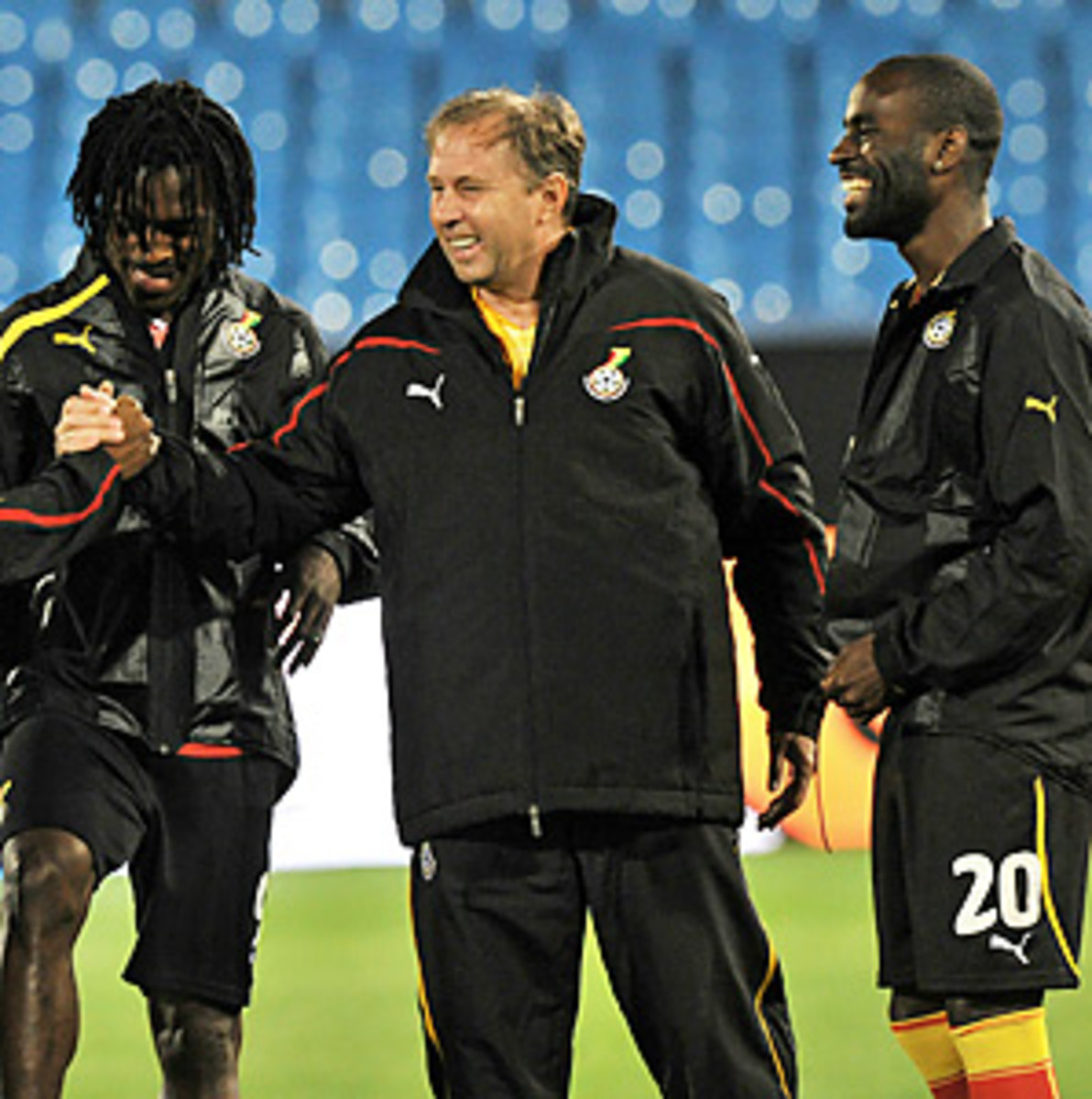Ghana aims at history with a smile
Attending training sessions at the World Cup tends to be an exercise in observing paranoia, as the media is shuffled away after 15 minutes of watching suspicious players engage in desultory stretching exercises.
Not with Ghana, though. For a team standing on the brink of history, Ghana's players seem remarkably relaxed. Their training this week has had an air of hilarity, with media welcome to linger and observe their end-of-session short-pitch games, contested with a gleeful competiveness that speaks to a great team spirit.
That sense of cohesiveness has been elusive for many teams. After being sacked as manager of the Ivory Coast in February, Vahid Halilhodzic noted that one of his big problems had been trying to generate a sense of togetherness. "One of biggest problems is the fact that most of the players are very narcissistic, individuality comes first," he said. "The personal has precedence over team interest, so there is a lack of team spirit, and this makes it impossible to create winners."
But Milovan Rajevac, the Serbian coach who bears a vague resemblance to Chevy Chase, has been able to forge a sense of togetherness on his Ghana squad with bold action after replacing Claude Le Roy as Ghana coach in August 2008.
When Michael Essien, Asamoah Gyan and Sulley Muntari skipped a friendly against Angola last November, he fined them all $3,000. When Muntari was slow to pay, he dropped him from the squad for the Cup of Nations. Muntari is back, but despite playing for Internazionale, the European champions, he has been unable to force himself back into the starting 11.
The Cup of Nations presented the first sign that this Ghana squad could achieve something special in South Africa. Despite the absence of Muntari, and the injuries to John Mensah, John Pantsil, Essien, Laryea Kingston and Stephen Appiah, Ghana reached the final, relying on a core based around the team that had won the Under-20 championship in Egypt. "The young players surprised us," Mensah admitted. "There were many of us older players [who] weren't at the Cup of Nations, but the young players went there and they demonstrated their quality and did well and we're all proud of what they did," said Rajevac.
Perhaps the most impressive of the youngsters has been Andre "Dede" Ayew, the son of Abedi Pele, considered by many the greatest Ghanaian player ever. A year ago, he returned to Marseille after a successful loan at Lorient, only to find that coach Didier Deschamps didn't want him, and he ended up being loaned out to the second-division side Arles-Avignon.
"In life there are events that make you go forward and grow up fast," said Ayew, who had grown up in the academy at Marseille, where his father had dazzled in the early-'90s." I had played about 30 games with Lorient and when I arrived back at Marseille I heard that they didn't want me. I had to bounce back. I had to make the right divisions. There was no room for error. I had the chance to choose Arles, and they trusted me.
"Everybody was behind me, and more important, they let me play in my natural position on the right side of midfield."
Arles won promotion, which with a victory in the Under-20 championship and a runners-up medal from the Cup of Nations, has made this an extraordinary season for Ayew.
"All this was very important, but after what happened last year, to play in a World Cup is something I couldn't have hoped for," he said. "I learned a lot. I'm tougher from a mental point of view. At the end of the day this was bad but something good came from it. I succeeded in having my head high again."
A victory for Ghana over Australia would go a log way toward ensuring qualification into the knockout round, making it only the second African side to make it through the group stages for a second time. Australia lost its first game 4-0, but Ghana's players are wary of complacency. "They won't play like that against us," said Mensah.
Tactically, Ghana is probably as sophisticated as any West African team has been, something that was apparent not just at the Cup of Nations but also in its opening win over Serbia. "The coach is good," Mensah said. "We all know that. He does his tactical thing and we do what he says. This compact play, that's what he wants and it's what we do and we all believe this compact play will help us move forward."
Ghana's midfield five squeeze the opposition, and while it might not be the most thrilling football to watch, it is undeniably effective.
Of Ghana's last six competitive games, four have been won 1-0, all of them in a manner that generated and air of command once it had the lead. Ghana's first priority is to win control of the center, and then to get the goal that will convert that superiority into victory.
Perhaps Asamoah Gyan is left isolated at times, but as Rajevac has made clear from the start, results matter more to him that excitement.
Given that no other African team has yet won a game at this tournament, it is hard to argue with his method." I follow the instructions," said Ayew. "We have to defend well before attacking. That's exactly what we have done as a team, and we've been rewarded for it. It's important for us to bring happiness to our country and to Africa."






